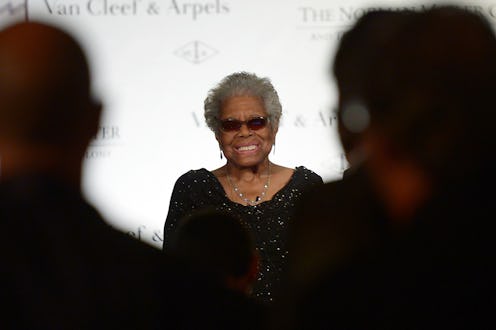Books
Maya Angelou Had Some Beautiful Advice For Grads
Maya Angelou passed away Wednesday, but she leaves with us an enduring legacy. Angelou was a poet, an essayist, an author, a Civil Rights activist, and an icon. Throughout her decades in the public eye, Angelou also gave a whopping 18 commencement addresses to graduating classes. And who better, really, to give advice on jumping into life and seizing the best of it than Maya Angelou?
Angelou spent her young adulthood having more experiences than most people have in a lifetime. By the time she published her first memoir in her 40's, she'd already worked as a fry cook, a nightclub performer, a madam for lesbian prostitutes, an opera cast member for Porgy and Bess, and a journalist in Ghana and Egypt during decolonialization. There was nothing small or uninteresting about the life of Maya Angelou, even before every student in America learned her name.
Angelou's words have resonated throughout the decades, with a timelessness making them as relevant now as they were on the days she spoke them. She spent her life as a teacher, after all, whether through the words she wrote and recited for the country, or through her years as a professor at Wake Forest University.
Here is some of our favorite advice that Maya Angelou gave to young grads.
"Commencement Address," Letter To My Daughter
Of all your attributes — youth, beauty, wit, kindness, mercy — courage is your greatest achievement. For you, without it, can practice no other virtue with consistency.
Wellesley College Commencement Address, 1982
It is upon you to increase your virtue, the virtue of courage—it is upon you. You will be challenged mightily, and you will fall many times. But it is important to remember that it may be necessary to encounter defeat, I don’t know. But I do know that a diamond, one of the most precious elements in this planet, certainly one in many ways the hardest, is the result of extreme pressure, and time. Under less pressure, it’s crystal. Less pressure than that, its coal, less than that, its fossilized leaves are just plain dirt.
You must encounter, confront life. Life loves the liver of it, ladies. It is for you to increase your virtues. There is that in the human spirit which will not be gunned down even by death. There is no person here who is over one year old who hasn’t slept with fear, or pain or loss or grief, or terror, and yet we have all arisen, have made whatever absolutions we were able to, or chose to, dressed, and said to other human beings, “Good morning. How are you? Fine, thanks.”
Therein lies our chance toward nobleness—not nobility—but nobleness, the best of a human being is in that ability to overcome.
Quinnipiac University Commencement Speech, 1996
You cannot be consistently fair or just or kind or generous or loving without courage. It is time for you to decide privately, secretly, in your own place inside yourselves, what you will do. You have to come to peace with a peaceful heart.
Holton Arms Commencement Speech, 2011
I'm telling you now, when you prepare to walk out [on someone or something], try to make sure you have your keys. But there are ways in which you can develop courage. One way is to speak to people. Speak to people you don’t know. Say good morning, good morning. You have no idea what you may have done for someone. She may have just hung up the phone from having a nurse say, Miss Jones the doctor wants you to come back in he's not satisfied with these x-rays. You don’t know.
University of California, Riverside Commencement Speech, 1977
It seems to me that a commencement address always comes after the fact, after the long hours, after the tedious work, after trying to come to grips with somebody else’s ideas, after trying to stimulate one’s own brain so that it may come up with some ideas of its own. After all that, and even after the institution of higher education says to you, 'You have done well, and to prove it I’m going to give you a diploma. After all that, then along comes a stranger who says, 'I’m going to give you a commencement address.' It seems a contradiction, or else a little presumptuous. However, (pauses for laughter) there is a challenge that faces you that is incredible. And the challenge is not new. However it has not abated. The challenge is how to create a sense of adventure toward life and how to maintain that sense of adventure.
There is an African statement that says, 'The trouble for the thief is not how to steal the bugle, but where to blow it.' And it would seem that the trouble for you is not just how to get out of this institution, but once out, what does one do? Does one simply sit with that diploma and say, 'I have found the one way, the true way for myself and I call all the others false.' Or do you indeed join life, that is the challenge.
